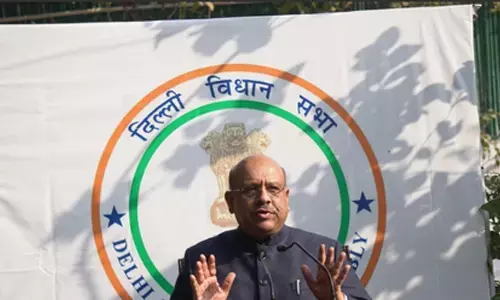A taxing reform

The Goods & Services Tax is three-month-old in the country now. Before its advent, industry leaders and mandarins in the central government were unanimous in saying the new direct regime, once implemented, would boost GDP growth by 1.5 to 2 per cent. But the country’s experience with GST thus far paints a starkly different picture.
The Goods & Services Tax is three-month-old in the country now. Before its advent, industry leaders and mandarins in the central government were unanimous in saying the new direct regime, once implemented, would boost GDP growth by 1.5 to 2 per cent. But the country’s experience with GST thus far paints a starkly different picture.
The GDP growth in the first three months of the current financial year fell to a three-year low of 5.7 per cent. And that three-month period included July, the month that saw the implementation of GST amid much fanfare. That means instead of boosting economy as propagated by the proponents of the new tax regime, GST has led to decline in the growth numbers.
However, as some point out, one month is too short a period to gauge the impact of GST, a structural reform that has converted India into a single market for majority of goods and services. But there is a widespread feeling among industry circles that the Narendra Modi-led government has rushed in GST without readying proper technology and implementation ecosystem for the new tax regime. And that’s causing teething problems to traders and MSMEs.
Further, procedural complications have compounded their woes. Under GST, businesses are required to file three returns every month – one each for sales and purchases and the third one is a wrap-up of both. For small businesses, that’s cumbersome and costly process.
As a result, a large number of business units have failed to file returns for the first month i.e., July till now, forcing the government to extend the deadline twice from the original September 5 date. More than 20 lakh registered businesses are yet to file returns for the first month even as the latest deadline of October 10 is close-by. That’s a clear indication of chaotic situation prevailing in the industry and trade.
As if procedural issues are not enough, GST Council, the all-powerful body comprising Union Finance Minister and his counterparts from the states, has revised tax rates, added new levies and made numerous changes during the last three months. To put bluntly, the Council changed goal posts every time it met, thereby exposing the central government’s unpreparedness for the historic tax reform. For instance, automobile industry found itself in a piquant situation when the Centre increased cess on luxury vehicles from 15 per cent to 25 per cent.
That change came within one month after GST rollout. As a consequence, automakers had to roll back price cuts they offered to consumers. In the last meeting at Hyderabad too, the Council revised tax rates for 40 products. Of course, many household items turned cheaper because of the tax cuts, but frequent revisions will obviously leave an adverse impact on businesses.
However, the GST Council at its latest meeting on Friday made life a lot easier for small businesses by allowing them to file their returns every three months. MSMEs with annual turnover up to Rs 1.5 crore will benefit from it. But it’s time the government appoints an expert committee on GST and go for changes at one go instead of the ongoing piecemeal exercises.

















